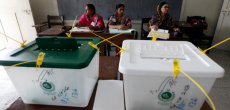[vc_row][vc_column][vc_column_text dp_text_size=”size-4″]In the 2024 general elections, Ali Amin Khan Gandapur of the Pakistan Tehreek-e-Insaf (PTI) emerged victorious in the NA-44 Dera Ismail Khan-I constituency, defeating Maulana Fazlur Rehman, the Chief of Jamiat Ulema-e-Islam-Fazl (JUI-F).
Gandapur secured a total of 92,612 votes, while Maulana Fazlur Rehman garnered 59,364 votes. This marks a significant win for Gandapur, and the results reflect a clear mandate from the constituents in NA-44. The victory margin showcases the support for PTI in this particular constituency.
Comparing the recent election results with those of the 2018 general elections, Ali Amin Khan Gandapur had also emerged victorious at that time with 80,236 votes. In the 2018 elections, Maulana Fazlur Rehman secured the second position with 45,457 votes. The substantial increase in Gandapur’s votes in the 2024 elections further solidifies his standing in the constituency.
The NA-44 Dera Ismail Khan-I constituency has a population of 772,742, and out of this, 391,882 individuals are registered as voters. The gender distribution among registered voters includes 208,481 males and 183,401 females. The high voter turnout and the support received by Ali Amin Khan Gandapur suggest a dynamic political landscape in this constituency.
Read more: Latif Khosa Wins NA-122 In 2024 Elections
The victory not only reaffirms Gandapur’s popularity but also indicates the constituents’ trust in the policies and leadership of the PTI. The competition was intense, given that Maulana Fazlur Rehman is a prominent political figure in Pakistan. However, the election results reflect the prevailing sentiments and preferences of the electorate in NA-44.
The 2024 general elections have been a crucial juncture for Pakistani politics, and the outcomes in individual constituencies contribute to shaping the broader political landscape of the country. As the dust settles, the focus will shift to the implications of these results on national governance and the policies that will be pursued in the coming years.
[/vc_column_text][/vc_column][/vc_row]











